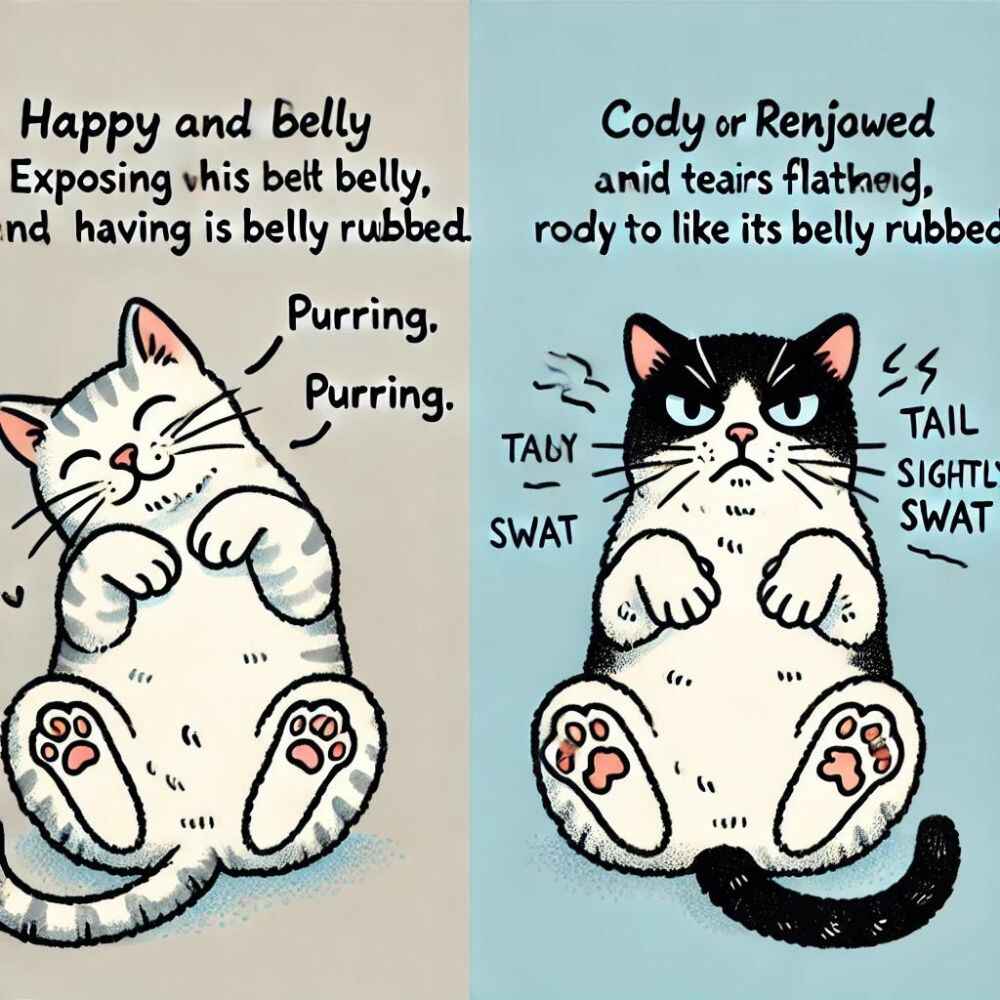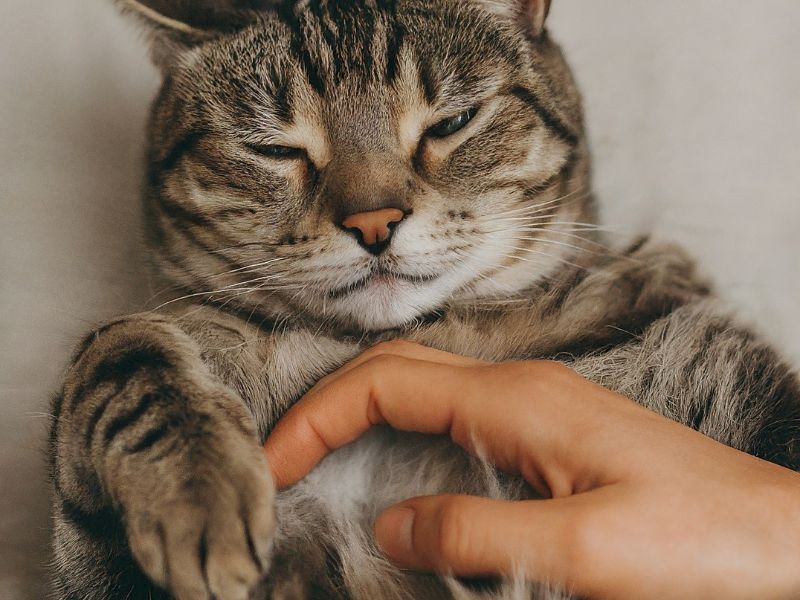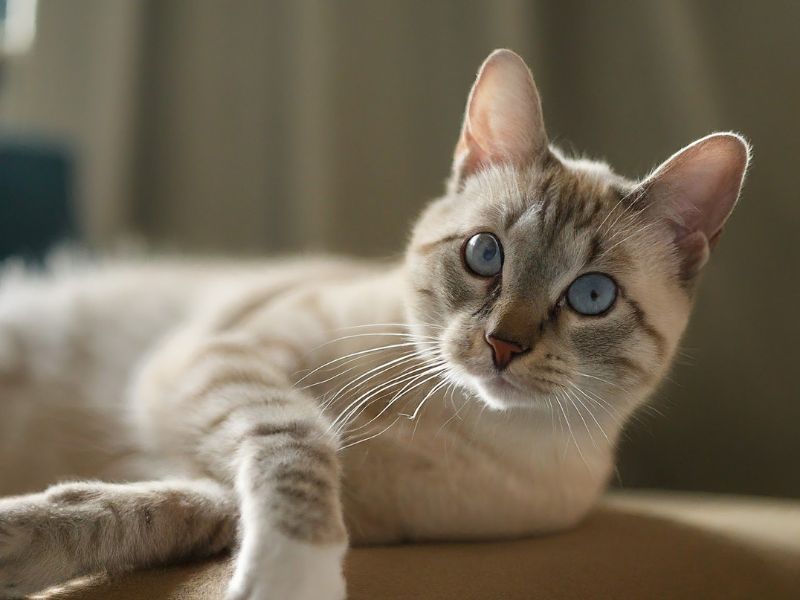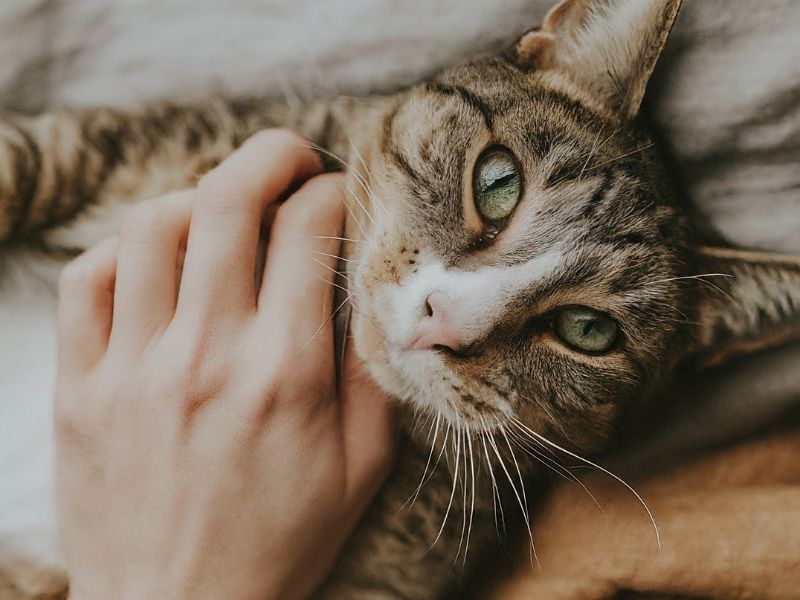Have you ever tried rubbing your cat’s belly, only to get swatted or kicked? It’s hard to resist that fluffy tummy when your cat rolls over, right? But do cats actually want belly rubs, or are they setting a trap?
The truth is, some cats love belly rubs, and others don’t. It all depends on your cat’s personality and mood. But if they don’t want you to touch them, why do they keep showing off their bellies?
Let’s dive into the reasons behind this curious cat behavior and find out if your cat likes belly rubs!
- Why Do Cats Show Their Belly?
- Do Cats Like Belly Rubs? The Short Answer
- When Do Cats Like Belly Rubs?
- Why Some Cats Hate Belly Rubs
- How to Safely Approach Your Cat’s Belly
- What to Do if Your Cat Scratches or Bites During a Belly Rub
- How to Tell if Your Cat is in the Mood for a Belly Rub
- Conclusion: To Rub or Not to Rub?
- FAQs About Cats and Belly Rubs
Why Do Cats Show Their Belly?
Why do cats show their bellies in the first place? If your cat rolls over and exposes its belly, you might think it’s an invitation for a rub. But hold on a minute! In the world of cats, showing their belly isn’t always about asking for a pet.
Cats show their bellies for various reasons. It can be a sign of trust, a defensive posture, or simply a comfortable stretch. When a cat exposes its stomach, it’s showing you its most vulnerable area.
So, if your cat shows you its belly, it could mean that they trust you deeply. But it doesn’t always mean, “Hey, give me a belly rub!”
Understanding Feline Body Language
Cats communicate a lot through their body language. From the twitch of their tail to the tilt of their ears, they are always sending signals.
When a cat flops down and shows its belly, you need to pay attention to the whole picture. Are their ears flattened? Are their tails flicking back and forth? Is their body relaxed or tense?
Understanding these cues will help you determine whether they’re in the mood for a belly rub or just feeling playful (or even annoyed!).

Do Cats Like Belly Rubs? The Short Answer
So, do cats like belly rubs? The short answer is – it depends on the cat. Some cats absolutely love it, while others find it uncomfortable or threatening.
It all comes down to the individual cat’s personality, past experiences, and comfort level with you.
The Evolutionary Perspective: Instincts at Play
To really understand a cat’s reaction to belly rubs, we need to look back at their evolutionary history. In the wild, a cat’s belly is its most vulnerable area. It houses vital organs that, if injured, can be fatal.
This instinct is still very much alive in our domesticated cats. When you reach for their belly, their instincts might kick in, causing them to swat or bite in self-defense.
When Do Cats Like Belly Rubs?
Some cats do enjoy belly rubs, but it’s usually under very specific conditions. A cat that likes belly rubs is often one that:
- Trusts you deeply
- Is in a relaxed and happy state
- Has been socialized to accept petting on its belly from a young age
If your cat meets these conditions, then chances are, they might enjoy a gentle belly rub every now and then.
Signs Your Cat Likes Belly Rubs
How can you tell if your cat likes belly rubs? Look for these positive signs:
- Purring: A clear indicator that your cat is enjoying itself.
- Relaxed Body Posture: If your cat’s body is loose and they look comfortable, they’re likely enjoying it.
- Slow Blinking: Cats blink slowly when they’re happy and relaxed.
- Kneading: Paws pressing rhythmically is a good sign your cat is content.
Signs Your Cat Does Not Like Belly Rubs
On the flip side, here are some signs your cat isn’t a fan:
- Swatting or Biting: Clear signs of discomfort or annoyance.
- Tensed Muscles: If their body feels stiff or tense, they’re probably not happy.
- Flattened Ears: Indicates fear or irritation.
- Tail Flicking: Fast tail movements are often a sign of agitation.

Why Some Cats Hate Belly Rubs
Not all cats hate belly rubs, but for those that do, there are a few reasons:
- Vulnerability: Their belly is a sensitive area, and touching it makes them feel exposed.
- Sensitivity: Cats have very sensitive skin, and too much petting can be overstimulating.
- Past Trauma: A bad experience in the past can make a cat wary of belly rubs.
According to Dr. Kelly Ballantyne, a board-certified veterinary behaviorist, a cat’s belly is one of its most vulnerable areas. When a cat exposes its belly, it’s a sign of trust, but it doesn’t necessarily mean they want you to touch it. “For many cats, belly rubs can feel threatening, triggering their natural defensive responses,” says Dr. Ballantyne.
How to Safely Approach Your Cat’s Belly
If you think your cat might be open to belly rubs, take it slow. Here’s how:
- Start by Petting Their Head and Back: Gauge their mood before moving to the belly.
- Watch for Positive Signs: Look for the signs we mentioned earlier.
- Be Gentle: Use a light touch to avoid overstimulation.
- Know When to Stop: If your cat shows signs of discomfort, stop immediately.
Alternatives to Belly Rubs: Other Ways to Show Affection
If belly rubs are off the table, there are plenty of other ways to show your cat you care:
- Chin Scratches: Many cats love a good scratch under the chin.
- Ear Rubs: A gentle massage on the ears can be very soothing.
- Interactive Play: Use toys to engage with your cat and strengthen your bond.
Common Misconceptions About Cats and Belly Rubs
A common misconception is that a cat showing its belly is always inviting you to rub it. While this can be true for some, it’s not a universal rule. Understanding your cat’s unique personality is key!
Tips for New Cat Owners
If you’re new to the world of cats, here are some tips:
- Be Patient: It takes time to understand your cat’s likes and dislikes.
- Observe Closely: Pay attention to their body language.
- Respect Their Boundaries: Never force a cat into a situation where they’re uncomfortable.
What to Do if Your Cat Scratches or Bites During a Belly Rub
If your cat lashes out during a belly rub, don’t take it personally. It’s just their way of communicating.
Simply stop and give them space. Over time, you’ll learn their cues and know when to engage and when to back off.

How to Tell if Your Cat is in the Mood for a Belly Rub
Sometimes, it’s all about timing. If your cat is relaxed and happy, perhaps after a meal or a nap, they might be more open to a belly rub.
But always look for those positive signs first!
Conclusion: To Rub or Not to Rub?
So, do cats like their belly rubbed? The answer is… it depends! Every cat is unique, with its own set of likes, dislikes, and quirks. Some cats will adore a gentle belly rub, while others will react with a swat or a bite.
The key is to pay attention to your cat’s body language, respect their boundaries, and find other ways to show them love if belly rubs aren’t their thing. Remember, it’s all about building trust and understanding with your furry friend.
FAQs About Cats and Belly Rubs
- Why does my cat show me its belly but then scratch me?
Your cat might be showing you its belly as a sign of trust, but touching it may trigger their defensive instincts. - Can I train my cat to like belly rubs?
It’s possible, but it depends on your cat’s personality. Start with gentle petting and see how they react. - Why do some cats purr and then bite during a belly rub?
Purring doesn’t always mean contentment. It can also signal anxiety or overstimulation. If they bite, they’re likely overstimulated. - What areas do cats generally like being pet?
Most cats enjoy being pet on the head, chin, and cheeks, where their scent glands are located. - How can I show affection to my cat if they dislike belly rubs?
Try chin scratches, ear rubs, or interactive play. Respecting their boundaries is also a great way to show love.

Pingback: Why Does My Cat Lick Herself So Much? Top Reasons